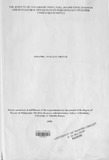| dc.description.abstract | The study investigated the effects of ownership structure, board effectiveness and
managerial discretion on performance of listed companies in Kenya. Pertinent literature
on corporate governance has paid much attention to effectiveness of the Board of
Directors, to the exclusion of other vital organs and structures of governance such as
ownership structure and management. The study therefore, sought to establish the role of
these other organs alongside the Board in the overall governance of the firm, using
Agency Theory as an analytical framework.
Ownership structure was operationalized in terms of ownership concentration (percentage
of shares owned by the top five shareholders) and ownership identity (actual identity of
shareholders: Government; Corporations/Institutions; managers/Insiders; Foreign; and
Diffuse/Diverse). Board effectiveness was operationalized in terms of Leadership,
Monitoring, Stewardship and Reporting, while Managerial Discretion was
operationalized in terms 01 Locus of Control, Perceived Power and Perceived Discretion.
Measures of performance used in the study were Return on Assets (ROA), Return on
Equity (ROE) and Dividend Yield (DY).
All the fifty four companies listed at the Nairobi Stock Exchange were targeted for this
study, but after eliminating five of them which were listed in 2006, and one that was on
suspension from the bourse, forty eight companies were eligible, out of which forty two
valid questionnaires were used. Both primary and secondary data were used in this study.
The secondary data (financial performance and ownership concentration) were collected
from the Nairobi Stock Exchange Handbook for 2006. On the other hand, primary data
(ownership identity, board effectiveness and managerial discretion) were collected using
a customized Brown Governance Evaluative Framework questionnaire.
The study was cross sectional design that utilized data for 2006 only. Both primary and
secondary data were collected in 2008, although they related to 2006 because the data for
2007 was not ready by the time of data collection. Because of the time lag between 2006
and early 2008 when the data was collected, the researcher ensured that respondents were
chosen only from amongst those who were in the companies by 2006, and were well
conversant with the issues being studied. In this regard, the respondents were
purposively chosen from the ranks of Chief Executive Officer, Top Management and
Line Management.
The study employed Pearson's Product Moment Correlation, Linear Regression, Logistic
Regression, Moderation models, and Step-wise Regression and Hierarchical Change
Statistics (i.e. ANOV A and F Tests) for data analysis and tests.
The results of the study indicated that Ownership Concentration, Board Effectiveness and
Government Ownership have significant negative relationships with firm performance.
This is attributable to the excessive monitoring, control and ratification powers that
principals wield over managers In such ownership arrangements, and this grossly
emasculates managerial innovation and creativity, thereby compromising corporate
performance. On the other hand, Foreign Ownership, Diffuse Ownership, Corporation
Ownership, Manager Ownership were found to have positive relationship with firm
performance, principally because these ownership scenarios afford managers sufficient
discretion for innovation and creativity, which in turn translate to superior corporate
performance.
The strength of the relationship between managerial discretion and firm performance was
found to be moderated by internal influences (i.e. size, intangible assets and leverage) in
terms of Return on Assets and Return on Equity, but not with respect to Dividend Yield.
The relationship between managerial discretion and firm performance was moderated by
market influences (i.e. managerial labor markets, product market and financial markets)
only with regard to Dividend Yield, but not Return on Assets or Return on Equity. These
results clearly indicate that market influences moderate the relationship with regard to the
market-dependent performance indicator (DY), while internal influences moderate the
relationship with regard to internal indicators (i.e. Return on Assets and Return on
Equity). Using ANOVA and F-tests, the study showed that the relationship between
Ownership Structure and firm performance was direct (i.e. not hierarchical through board
effectiveness and managerial discretion).
The study had a number of implications both for theory as well as practice. First, the
study found Agency Theory to be very robust as an analytical framework for corporate
governance. Second, the Board of Directors, as the core of traditional corporate
governance framework was found to be inadequate, and needs to be invigorated. Third,
risk preference of shareholders is critical to corporate performance. Equally important is
the fact that managerial motivation and entrenchment through executive share options
and other perks improves corporate performance. | en |

